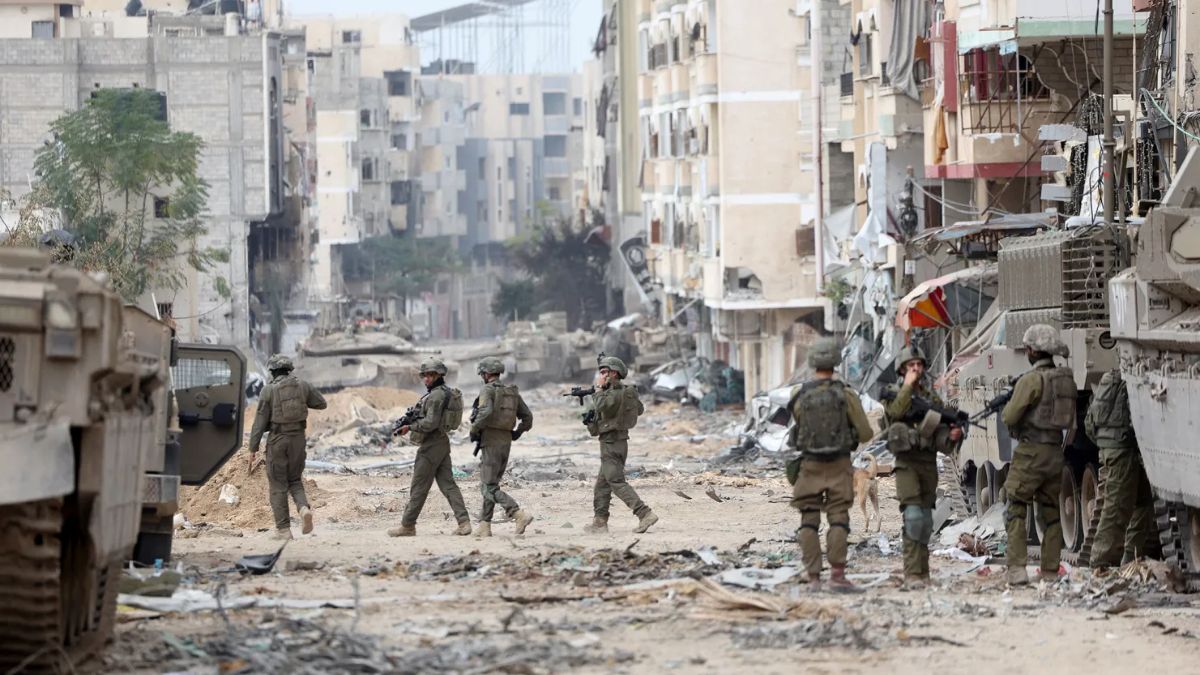Following the killing of Hamas chief Yahya Sinwar, the negotiators have converged in Qatari capital Doha on Monday (October 28) to look for a way to end the war in the Gaza Strip.
For nearly two months, no indirect talks had been held between Israel and Hamas as Sinwar hardened his position and Israeli Prime Minister Benjamin Netanyahu also refused to budge from his demands.
In recent months, Israel has hammered Hamas in Gaza and Hezbollah in Lebanon militarily and eliminated their leadership. Israel had been hoping that such military pressure, along with Hamas’ encircling on the ground in Gaza, would force Hamas to come to the negotiating table where Israel would be able to join talks from a position of strength. The death of Sinwar appears to have been the decisive factor in the resumption of talks.
Even though the talks have resumed, there is no assurance that peace in the Gaza Strip is within grasp. The idea, however, for peace has been fairly simple since the beginning: ceasefire in lieu of the release of hostages.
Israel has maintained that Hamas can end the war in Gaza any moment by releasing the hostages, but is it really that simple? Is the question of hostages the only factor preventing peace in Gaza?
Direct conflict between Israel & Iran
For decades, Israel and Iran fought a shadow war but stopped short of overt attacks on each other — until this year.
Israel and Iran have exchanged direct blows twice this year. Both rounds of aerial attacks complicated the peace efforts and pushed the region to the brink of a full-scale war. As tensions spiked with such exchanges, the scope of ceasefire reduced.
Impact Shorts
More ShortsHamas & Hezbollah’s leadership loss
While the conventional thinking has been that the elimination of Hamas and Hezbollah’s leaders, most notably Ismail Haniyeh, Hassan Nasrallah, and Yahya Sinwar, put pressure on the group that eventually brought it back to the negotiating table, and such a line of thinking is indeed correct, there is another line of thinking that says that ironically such moves also put off peace talks at least in the short term.
For example, Haniyeh was considered not as hardliner as Sinwar. After Haniyeh’s assassination in Tehran, Sinwar took over and continued to harden the position in talks right until his killing.
While assassinations of leaders mount pressure on the group, there is also the possibility that the successor could be more hardliner than the one who has been assassinated. Such a successor could harden the group’s stance further instead of buckling under pressure — like Sinwar did.
The US proposal or the Egyptian proposal?
Even though much of the peace talks have so far taken place under the framework floated by US President Joe Biden earlier this year, Egypt has now floated another framework.
While Biden’s framework is a three-step approach to end the war in the Gaza Strip with a ceasefire and return of all hostages, Egyptian proposal is much smaller in its scope where it calls for a two-day ceasefire in lieu of the release of four hostages.
Israel and Hamas need to decide which framework they want to follow. So far, Israel has maintained a commitment to the US framework even though a deal has been elusive over differences regarding modalities. However, now Israel may take up the Egyptian offer as well, according to The Times of Israel.
Israel is exploring the possibility of a smaller deal to kickstart the talks with Hamas, said an Israeli official to the newspaper.
Such a smaller deal under the Egyptian proposal could act as a confidence-building measure for the larger deal under the US framework.
Egypt and Qatar are mediating the talks between Israel and Hamas and the United States is facilitating these talks.
Netanyahu’s conditions as obstacles
Even though Sinwar and Hamas’ hardening stance has been largely attributed to the stalling of peace talks in recent months, the talks had previously been stalled over Israeli Prime Minister Benjamin Netanyahu’s demands.
Even as Hamas appeared to agree, at least in principle to the US-floated proposal, Netanyahu inserted a number of new demands later into the proposal which Hamas rejected. That led to a stalemate in talks.
Among the demands inserted by Netanyahu, the most contentious were the continuing Israeli control of Philadelphi Corridor, a narrow strip of land along the Gaza-Egypt border, and the setting up of checkpoints along an east-west Netzarim Corridor in Gaza to screen Palestinians returning to their homes for weapons. Hamas rejected both of these demands.
UNSC meeting as talks start in Doha
The United Nations Security Council (UNSC) is scheduled to hold a meeting on Monday over Israeli airstrikes in Israel. The meeting has been called at the behest of Iran.
Talks are starting in Doha even as the region is on the edge over the possibility of an escalation and an expected war of words at the UN.
However, as both Israel and Iran have indicated a desire to avoid any escalation for now, there are hopes that some progress can be made in renewed peace efforts as Hamas and Hezbollah stand battered and there is an all-round push for a deal.
)